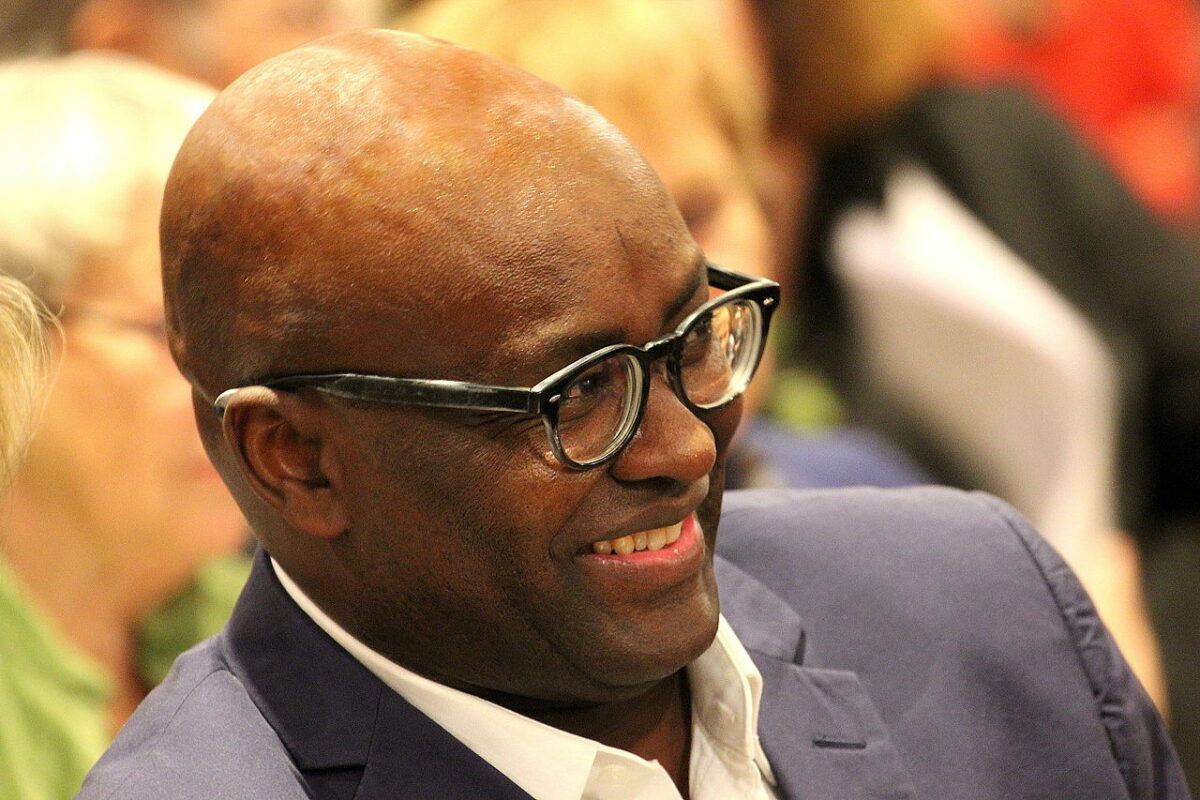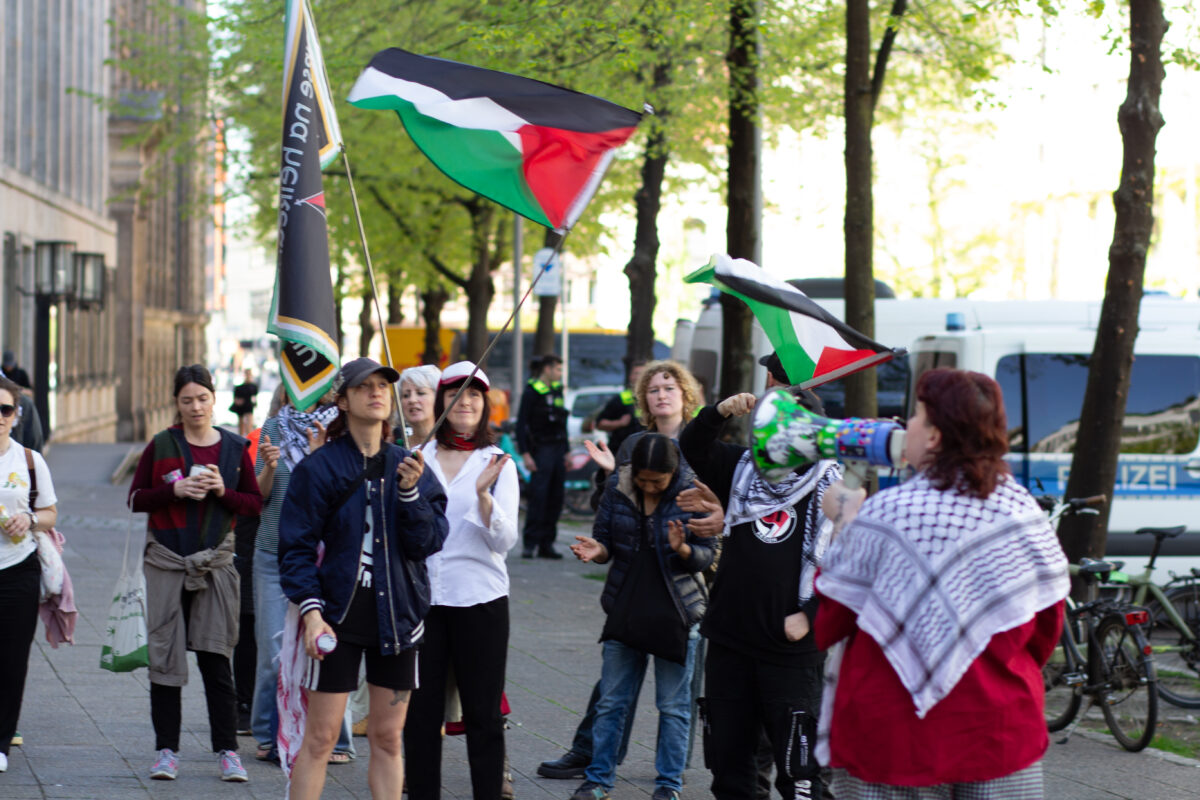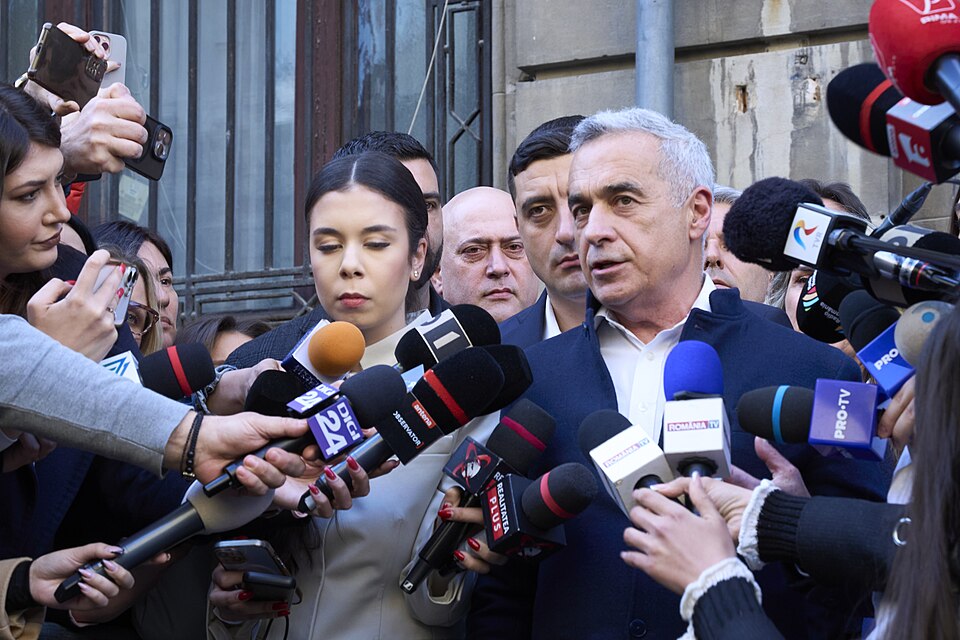“The charge of anti-Semitism becomes a strong projection of the history of the Holocaust onto the bodies of ‘outsiders’ like myself, those not directly interpellated by that history, as a classic form of psychoanalytic disavowal; I accuse you of doing what I am afraid I might be doing myself, what I very much so fear doing, what I don’t want to do myself” (J. Puar).
In Spring 2020, Felix Klein, the federal government commissioner for “Jewish life and the fight against anti-Semitism” in Germany, urged the organizers of the German Arts Festival ‘Ruhrtriennale’ to revoke their invitation of the renowned postcolonial scholar Achille Mbembe. Klein asserted that Mbembe was ‘unsuitable’ to speak at the Ruhrtriennale and legitimized his political stance on a cultural festival by accusing Mbembe of anti-Semitism and of ‘relativizing the Holocaust’ as Mbembe had equated the state of Israel with the apartheid system of South Africa in one of his academic writings.
Similar things happened that year to rapper Talib Kweli and the band Young Fathers who had their concerts cancelled after they were accused of anti-Semitism due to their support for the BDS-movement, and to Palestinian journalist Khaled Barakat who was denied a renewal of his residency permit in Germany because he constituted ‘a security risk’ for his ‘anti-Semitic’ viewpoints on the situation in Israel and Palestine.
Most recently, peaceful demonstrations in several German cities in response to the continued ethnic cleansing of Palestinians in Jerusalem –attracting thousands of protestors– have been condemned by popular German newspapers, such as Der Bild-Zeitung, as “Judenhass-Demos” that, according to Die Tagesschau, illustrate the “Problem mit Islamischem Antisemitismus in Deutschland”.
Mbembe’s disqualification from the right to speak in public for being judged as an anti-Semite, then, is not an isolated event in Germany, but part of a long list of cases in which primarily minority background Germans and non-Germans have been accused of promoting anti-Semitic sentiments.
In practice, then, one could argue that the interconnected commitments of German leaders to fabricate a redeemed ‘post-racial’ society through an almost obsessive and unidirectional focus on fighting anti-Semitism and remembering the Holocaust –now constituting a source of ‘German pride’ and a ‘new’ post-war German identity– increasingly work to project anti-Semitism onto racialized ‘Others’. Meanwhile, the constructed centrality of the Holocaust as the paradigmatic experience of racism and German and European racial history effectively works to sideline Germany’s colonial past as constitutive of German identity and to disavow the continued application of colonial instruments of racial rule in German and European post-colonial societies.
Hence, while I certainly do not wish to understate the seriousness of anti-Semitism or anti-Jewish attacks, whether perpetrated by Muslims or by right-wing extremists, this article sets out to discuss the outsourcing of anti-Semitism as a new field of racial governance that attributes to Muslims supposedly culturally transmitted psychopathologies that allegedly make them inherently prone to ‘intolerance’, subsequently driving a wedge between a ‘revitalized’, ‘redeemed’ and ‘color-blind’ Germany and minority, primarily Muslim, populations that have ‘not yet’ internalized the values of the post-Holocaust inclusive ‘Judeo-Christian’ society.
The Holocaust as ‘Screen-Memory’ and the Disavowal of Colonial Violence
The Holocaust against the Jews of Europe is internationally recognized as a modern genocide that changed the world. It has become a universal moral paradigm in democratic societies and its remembrance continues to have a significant impact on world politics and international law . The importance of remembering and ‘working through’ the Holocaust is, of course, particularly acute in contemporary Germany, where historical responsibility and “a primal scene of guilt and shame” for the crimes committed against the Jews by the National-Socialist regime have become the core around which German national identifications and self-consciousness are organized. Indeed, Moses notes how, after the end of the Second World War, German foreign policy officials were acutely conscious that “the world will carefully watch the new Germany and one of the tests by which it will be judged and allowed reintegration into the ranks of ‘civilized nations’ will be its attitude towards the Jews and how it treats them”.
In 1949, the US High Commissioner for Germany, John J. McCloy, spelled out to Germans that: “What this Jewish community will be, will be watched very closely and very carefully by the entire world. It will, in my judgement, be one of the real touchstones and the test of Germany’s progress toward light”. Hence, ‘stigma management’ became Germany’s main occupation, leading to what Nolte has referred to as a ‘theater of remembrance’ in which the memory of the Holocaust became reified into a ritualized narrative of social transformation.
At the turn of the twenty-first century, then, Germany’s ability to confront its dark past served to legitimize Germany’s reappearance on the world stage, transforming the act of coming to terms with the past into a positive attribute of German society, a moral ‘uplift’ story of the human spirit against intolerance, and a mark of special moral qualifications.
By performing an explicit break with and a ‘moving on from’ the Nazi state legacy, however, Germany effectively positioned the Third Reich as the paradigmatic example of racist practice, effectively freezing racism in a very specific period in history. Lewicki & Schoolman rightly note how this narrative is highly selective in its sole focus on only one of race’s many incarnations and in its disavowal of colonialism as part of an ‘enlightened’ German history. Indeed, El-Tayeb notes how German colonial activities were often neglected as irrelevant to German society and to colonial history in general. This perception, according to El-Tayeb, requires correction, as German colonialism, and particularly their genocidal intent to annihilate the Herero in Namibia in 1904, put the race theories already dominating the public mind into practice on a broad scale, breaking down previously effective taboos with regards to racial massacres.
As early as 1942, Korsch, a German philosopher wrote: “The novelty of totalitarian politics… is simply that the Nazis have extended to ‘civilized’ European peoples the methods hitherto reserved for the ‘natives’ or ‘savages’ living outside so-called civilization”. In his Discourse, Césaire famously described Nazi brutality as a “crime against the white man” that applied to Europe already existing and widely applied colonialist procedures, and, in a similar vein, Hannah Arendt wrote that African colonial possessions became the most fertile soil for the flowering of what later was to become the Nazi elite and opened the door for “a totalitarian government on the basis of racism”.
A number of scholars have pointed out, in this regard, that the designation of the Holocaust and anti-Semitism as the paradigmatic historical experience of racism, and the designation of ‘the fight for liberal tolerance’ as the ultimate benchmark for the ‘new’ German identity, not only salvages the ‘white mythology’ of contemporary Europe’s universalist claims to moral exemplarity, but paradoxically also ‘buries’ race. It fails to acknowledge that racialization and racially based inequalities are of a period that far precede the Holocaust and that its permutations continue to persist today.
The Externalization of Anti-Semitism to the Muslim Other
Bashir and Goldberg note how this ‘sorting operation’ is reenacted in the increasing use of the term ‘Judeo-Christian civilization’ which, according to Topolski, is a “post-Shoah by-product of Western Christian dominance that serves as a symbolic apology for Christian anti-Semitism” and has been so normalized and naturalized as ‘long-standing’ that it is often mistaken as ‘secular’ . This normalized ‘secular’ stance, however, very much forms the dominant norm by which other groups are symbolically judged, classified, categorized and excluded from the ‘European project’. Indeed, Bashir & Goldberg note that in an immense act of negation and denial, the Jew suddenly stands by (secular-)Christian civilization against Islam, leading to a situation in which responsibility for the Holocaust is gradually shifted to a very specific Other: that is, the Muslim immigrant (2019, 87).
Indeed, in today’s plural European societies, the construction of a ‘racism without race’ by ascribing to certain bodies a combination of perceived unsurmountable cultural attributes that excludes them from what is constructed as an exclusively civilized realm, is, according to El-Tayeb, Mbembe and Wekker, particularly visible in the externalization of Muslim populations. Ozyurek notes how a public discourse now dominates in Germany primarily concerning the Muslim ‘importation’ of anti-Semitism and it is in this context that Alice Weidel, a German politician in the Bundestag for the right-wing ‘Alternative für Deutschland’ could contend that “of course we have a problem with racism; but it is not the [problem of] German citizens, but of those Muslim migrants that do not want to integrate and do not accept our values”.
Germany’s commitment to human rights and tolerance implied in the phrase ‘Never Again’ is now widely perceived as being besieged by alleged ‘Islamic fundamentalists and Muslim anti-Semitists’. The choc en retour of the disavowed lineage of Orientalist projections, then, is the violence embedded in the naturalization of Islamophobic sentiments under the banner of ‘the fight for tolerance’.
Romeyn and Younes note how in the new geopolitical realities after 9/11, the idea of Muslim anti-Semitism fitted perfectly with the scenario of a ‘clash of civilizations’: the discourse around the War on Terror was merged with the parallel idea of a ‘War on Anti-Semitism’ in the body and psyche of the Muslim Other. Indeed, at the anti-Semitism conference in Vienna in 2005, it was argued that “at the root of [today’s] anti-Jewish efforts is the same kind of extremist [i.e., Islamist] thinking that lies behind the international terrorism that is threatening our civilization” .
The Vienna meeting was followed up with another conference in Berlin. There, European governments agreed to allocate funds to combat this ‘new’ form of anti-Semitism, effectively leading to a situation in which anti-Semitism training for white Germans was being replaced –in monetary support, number and scope– with state-sponsored civil-society projects and educational programs for youths with a ‘Muslim background’ . It was alluded that anti-Semitism was brought over from unresolved conflicts in the Middle east –primarily the Palestinian liberation struggle– and thriving on the “social frustrations of new minorities established through migration into the many member states of the European Union”.
It is noteworthy, and even profoundly ironic, that in Vienna and in Berlin, birthplaces of the worst modern form of anti-Semitism, Muslim immigrants were accused of bringing anti-Semitism to a Europe imagined to be otherwise free of it.
Similar to the workings of ‘homonationalism’ and ‘femonationalism’, then, in which the alleged sexual freedom of queers and women is juxtaposed to the alleged oppression of these groups among the Muslim Other, the trope of a ‘new anti-Semitism’ has become a convenient way of projecting blame onto the Muslim Other for complex social issues that might blemish the mainstream’s self-image ).
Each charge –the charge of homophobia, of sexism and of anti-Semitism– characterizes Muslims as immoral perpetrators and excludes them from the fold of the ethically normative European/German community, under the banner of the defense of the universal ‘cultural values’ of freedom and equality. This effectively produces “an experience of intimate communal aversion against the barbaric, uneducated, and savage practices that we as a civilized nation cannot allow to occur within our borders”.
By the time that the calls for a ‘war’ on this ‘new’ anti-Semitism were made, however, Germany had already witnessed a decade of racially motivated attacks –including killings and manhunts– targeting other than Jewish minorities. Indeed, Younes shows how the incitements to public policy actually stood in direct contradiction to police and intelligence statistics: between 2001 and 2005, there were around 43.6 anti-Semitic physically violent attacks per year in Germany.
In 2016, there were 30 attacks and in 2017, there were 28 physical attacks, with around 95% of them committed by right-wing white German individuals. In comparison, there were almost 2000 attacks on refugees in 2017 alone, around 900 attacks on German Muslims, along with more than 100 attacks on refugee aid workers. Furthermore, in 2017, there were 205 politically motivated criminal acts against parliamentary politicians and aid-workers who worked to achieve a more egalitarian society. Given the statistics, then, the threat to democracy or Western tolerance and civilization is numerically located in the attacks on refugees, Muslims and people of color, rather than in Muslim anti-Semitism.
I concur with Ozyurek, then, that understanding anti-Semitism as a malignant ideology supposedly ‘brought back’ to Europe by Muslims merely works to produce perpetrators out of marginalized, racialized, and disadvantaged people, while preserving a ‘redeemed’ and ‘innocent’ German identity. The implication is that the origin of, and solution to the marginalization of minorities lies with their ‘failed integration’ and ‘deficient’ cultural values, rather than with racial, social and economic segregation and spatial containment at the hands of German authorities. When it is established that Muslims are anti-Semitic –and worse, refuse to atone for it– it becomes difficult to recognize their position as victims in relation to European racism.
The charge of anti-Semitism, then, is instrumentalized as a way to turn the gaze away from historically informed Orientalist projections and more continuous patterns of violence as it depicts Muslim Germans as dishonorable and undeserving residents (Topolski 2020, 313). In line with the argumentation of Yaspir Puar, then, who argued that the incorporation of queer and gay subjecthood into the biopolitical regime of the nation has been ‘condoned’ by multicultural, liberal societies only in so far as the establishing of the regulatory norm of “queer, liberal secularity” allows for a “parallel process of demarcation from populations targeted for segregation, disposal, or death”, the figure of the Jew has been retrogressively instrumentalized to externalize racialized minorities on the basis of presumed cultural incompatibilities; to erase historical and contemporary racisms; and to subject minority populations to disciplinary securitization.
Conclusion
In conclusion, the outward projection of anti-Semitism to the Other enables the fabrication of an egalitarian, pure and post-racial self-image that stands in direct opposition to the violent and discriminatory actions that it justifies. In Germany, there is a growing confluence between the charge of anti-Semitism and the culturalization of race, in which colonialist racial categories persist, but are disguised in culturalizing rather than in biological terms. This process enables state actors, who embed Jews retrogressively in the European project, to externalize racialized minorities on the basis of presumed cultural incompatibilities; to erase their own historical and contemporary racisms; and to subject minority populations to disciplinary ‘integration’ techniques).
Racism is projected outward onto immigrant and primarily Muslim populations who are depicted as never having learned the right lessons from the Holocaust and thus remain external to the post-Second-World War ‘Judeo-Christian’ civilization, while the significance of German racist crimes is effectively played down in the fantasy of multicultural societies as tolerant, hospitable, open-minded and innocent. This is the effect of the collusion between the figuration of the Holocaust as the monumentalized and standardized object lesson in intolerance with the disabled and disavowed history of colonialism and (continued) colonial violence.
I agree with Romeyn that if the Holocaust should continue to provide the moral compass of the ‘new’ Europe, its lessons need to be universalized and extended beyond the specificity of Jewish suffering to include all forms of exclusion, discrimination and intolerance. What we need is an emancipatory move that redirects attention from Muslim anti-Semitism to anti-Muslim xenophobia and to the exclusivist (white, Christian) strains within Europe’s dominant ‘secular’ and ‘inclusive’ self-image, subsequently providing an immanent and vital challenge to the core of European self-understanding as ‘tolerant’, ‘raceless’ and ‘colorblind’.
Further Reading
- Brown, W. 2006. Regulating Aversion: Tolerance in the Age of Identity and Empire. New Jersey: Princeton University Press
- Césaire, A. 1972. Discourse on Colonialism. Trans. Joan Pinkham. New York: Monthly Review Press
- El-Tayeb, F. 2011. European Others: Queering Ethnicity in Post-national Europe. University of Minnesota Press
- Lewicki, A. & Schoolman, Y. 2020. “Building a new nation: anti-Muslim racism in post-unification Germany.” Journal of Contemporary European Studies 28
- Mbembe, Achille. 2017. Critique of Black Reason. Durham: Duke University Press.
- Wekker, G. 2016. White Innocence: Paradoxes of Colonialism and Race. Durham: Duke University Press
- Bashir, B and A. Goldberg. 2019. The Holocaust and the Nakba: A New Grammar of Trauma and History. New York: Columbia University Press
- Ozyurek, E. 2016. “Export-Import Theory and the Racialization of Anti-Semitism: Turkish- and Arab-Only Prevention Programs in Germany.” Comparative Studies in Society and History 58(1)
- Ozyurek, E. 2019. “Muslim Minorities as Germany’s Past Future: Islam Critics, Holocaust Memory, and Immigrant Integration” Memory Studies 15(1)
- Puar, J.K. 2007. Terrorist Assemblages: Homonationalism in Queer Times. London: Duke University Press.
- Romeyn, E. 2014. “Anti-Semitism and Islamophobia: Spectro-politics and Immigration.” Theory, Culture and Society 31
- Romeyn, E. 2016. “Liberal tolerance and its hauntings: Moral compasses, anti-Semitism and Islamophobia.” European Journal of Cultural Studies
- Romeyn, E. 2020. “(Anti) ‘new antisemitism’ as a transnational field of racial governance.” Patterns of Prejudice 54
- Topolski, A. 2020. “Rejecting Judeo-Christian Privilege: The First Step Towards Semitic Solidarity.” Jewish Studies Quarterly 27
- Younes, A. 2020. “Fighting Anti-Semitism in Contemporary Germany.” Islamophobia Studies Journal 5(2)




